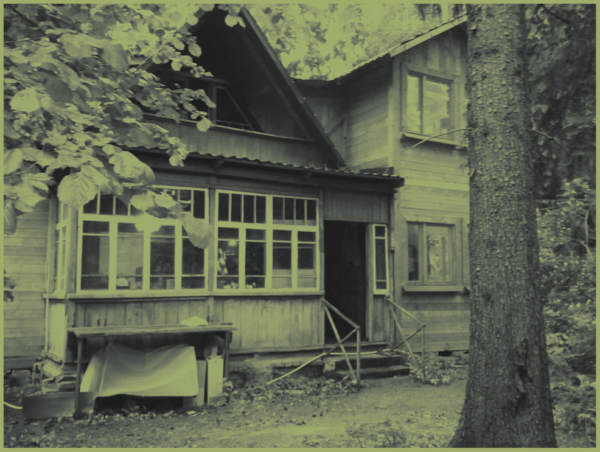
Dacha
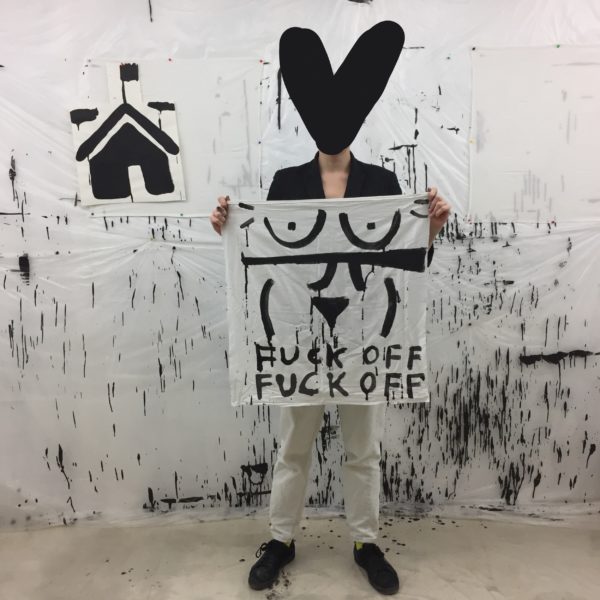
Alisa Yoffe / Алиса Йоффе, Situations, 2018.
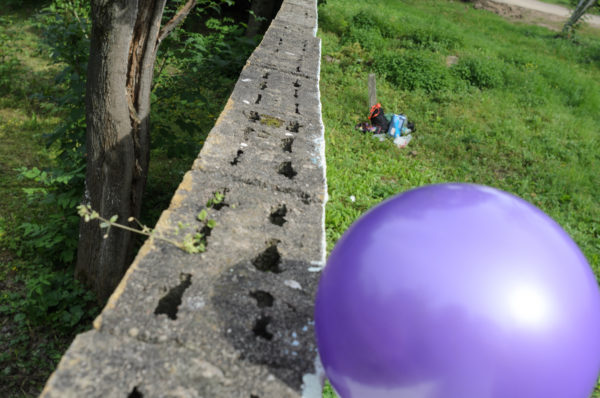
Psychosquash, Moscow 2017. Photo: Federation of the Psychosquash of Russia.
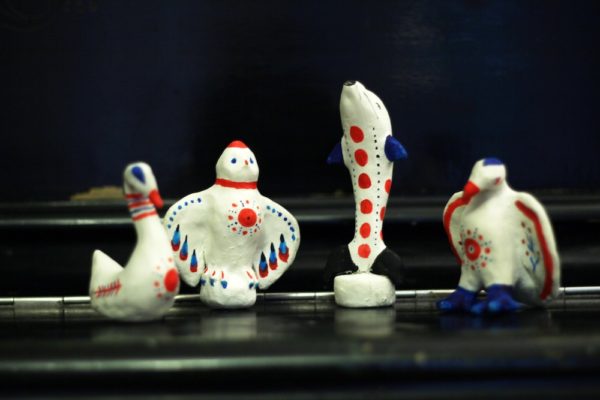
Kristina Markova, Special Regimen
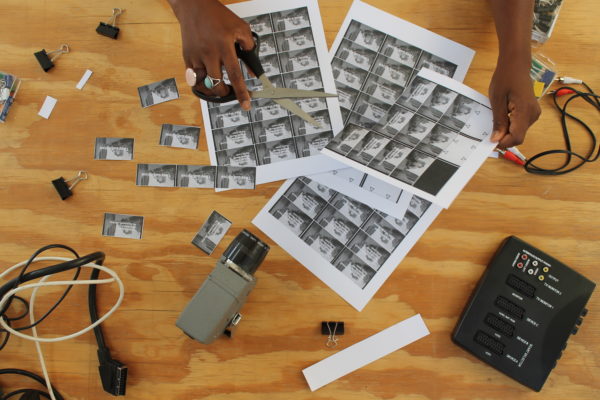
Karina Griffith, we Call It Love: An Oppositional Screening, 2018. Photo: Luisa Jürgens
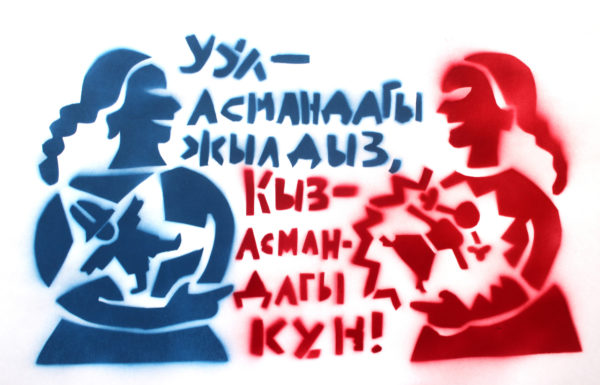
Victoria Lomasko, print from graphic reportage Truckers, Torfyanka, and Dubki: Grassroots protest in Russia, 2015–16
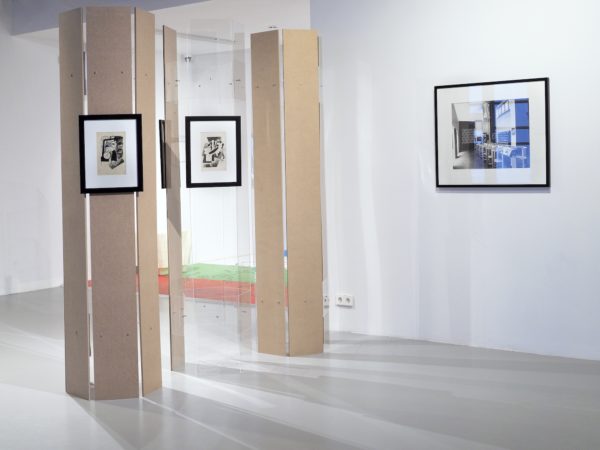
Paula Gehrmann, DISPLAY, exhibition view from Based on these new dependencies, we define five normal forms at Moscow Museum of Modern Art, photo: Paula Gehrmann, 2018
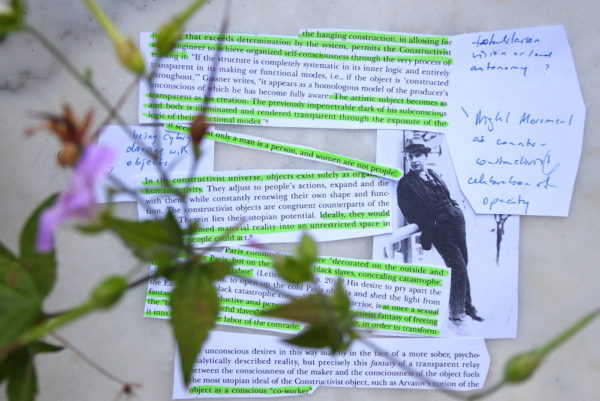
Suza Husse, text collage from Christina Kiaer’s Rodchenko in Paris, in: OCTOBER, Winter 1996, pp. 3-35, 2018
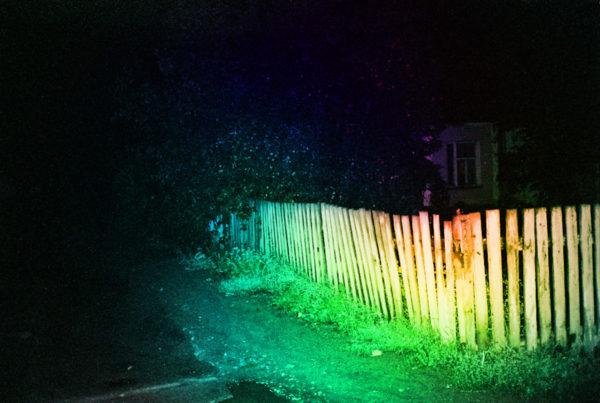
Night Movement, Secret Night, Moscow 2018. Photo: Alexandra Tryanova, Dacha.
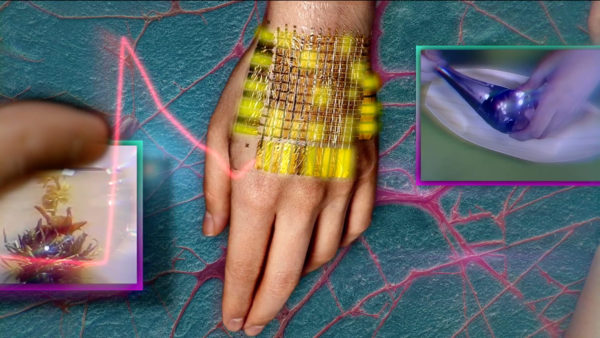
Marija Bozinovska Jones, Self Optimization, 2018. HD, Video Still, Single-Channel Video, Stereo Sound, Colour, 0’26’’
Exhibition, Performances, Dacha Transmissions
School Without Center *Moscow is
a nomadic platform for learning and unlearning together. knowledge from below. self-education. political imagination. pedagogies of freedom, kinship and change.
It takes place in art and between people, at the education center of the Moscow Museum of Modern Art, in a suburban dacha, in movements through the city, across the walls of institutions, in listening, cooking and dreaming together, in radio transmissions and on online platforms, in workshops and collective reading sessions and in forms that will emerge in time.
With contributions by Luis Berríos-Negrón & Paul Ryan, D’EST: A Multi-Curatorial Online Platform for Video Art from the Former ‘East’ and ‘West’ , Federation of the Psychosquash of Russia (Vladimir Kolesnikov, Michail Levin and Katrin Nenasheva), Paula Gehrmann, Karina Griffith, Victoria Lomasko, Kristina Markova, Night Movement (Nastya Ryabova and Gevorgizova Varvara), Andrei Petrov, Ljubow Sergejewna Popowa, Rena Rädle, Vladan Jeremić & Ina Wudke, Aleksandr Rodchenko, Jana Sotzko, Undisciplinary Learning WORK BOOK, Alisa Yoffe and others.
Curated by Nino Halka, Suza Husse, Andrea Caroline Keppler in conversation with Sergey Babkin, Anna Bitkina, Ulrike Gerhardt, Astrid Wege and Anna Zhurba.
PROGRAM
1 September 2018, 4 pm
School Without Center *Moscow
Exhibition Opening
Location: MMOMA Educational Center, Space B
Ermolayevsky per., 17, Moscow
1 September 2018, 6 pm
Night Movement (Varvara Gevorgizova, Anastasia Ryabova): Night Fall
Collective performative experience from museum to train, to dacha, to forest
2 September 2018, from 2 pm
Federation of the Psychosquash of Russia: Psychosquash
Type of sport and performance on both sides of an institutional wall
Match and live broadcast into the exhibition
Meeting point: MMOMA Educational Center, Ermolayevsky per., 17, at 12.30 pm
5 October 2018, 12 am – 4 pm
A queer day at the dacha
A self-education workshop and recreation session for LGBTQIA* folks and their friends.
in collaboration with Stimul Moscow
At the School Without Center *Moscow dacha at Zavety Il’icha.
6 October 2018, 6 pm
Public Launch
Screening Chapter #3: Cosmos Cosmetics. Unsettling Memoryscapes and Corpofictions
with works by Marija Bozinovska Jones, Maja Čule, Doplgenger, Kerstin Honeit, Ana Hušman, Ilona Németh, Katrin Nenasheva, Phuong Linh Nguyen, and Selma Selman
Curated by Miona Bogović, Suza Husse, Suzana Milevska
Guest: Anna Kray
7 October 2018, 2 pm
Public Launch
with works by Harun Farocki, Melanie Gilligan, Lynn Hershman Leeson, Lene Markusen, Henrike Naumann, Marta Popivoda & Ana Vujanović, Tabita Rezaire, Elske Rosenfeld, Shelly Silver
Curated by Eva Birkenstock, Ulrike Gerhardt, Naomi Hennig
Guest: Ilmira Bolotyan
7 October 2018, 7 pm
We Call it Love
How to decolonize research?
Artist talk with Karina Griffith and exchange moderated by Andrea Caroline Keppler
27 October, 2.30 – 5 pm
Documentary comic making
Workshop with Victoria Lomasko
DACHA
a space of opacity
a transmitter
of pleasure, learning, self-sustenance, inter-subjectivity, regeneration, intimacy, hospitality, alliance and re-imagination.
School Without Center inhabits a Dacha at the fringes of Moscow close to forests, streams and housing blocks. Here we invite guests, neighbors and chance encounters from inside and outside of Moscow. We share food, drinks, fire, ideas, struggles, laughter and pain, space for thought and practice, and many soft surfaces for resting and touching.
TRANSMISSIONS: The site-specific, temporary format offers an open forum for the reflection, documentation, sharing, advancement, and interconnection of artistic and activist practices and contents through intimate talks and other undisciplinary forms of conversation.
From the encounters between September and November 2018 a series of Dacha Transmission Podcasts will be created together with the writer and musician Jana Sotzko and made available at School Without Center exhibition and on www.district-berlin.com.
RESIDENCY: The Dacha Residency holds space for artistic experiments and research, for living and hosting. Moscow based artist Alisa Yoffe will be inhabiting the Dacha Residency.
Alisa Yoffe / Алиса Йоффе (*1987, lives in Moscow.)
Situations
Acrylic on canvas and fabric
2018
Alisa Yoffe preferably works in large-scale on canvas, walls, paper or textile. Her paintings often extend beyond the screen and fill entire rooms. Mainly working in striking visual black and white gestures, the black color effects a sculptural appearance of the images.
For School Without Center *Moscow Alisa Yoffe uses her expressive black and white wall paintings to make urgent past and present sociopolitical questions visible in the exhibition space. They deal with (im)possibilities of individuals within the system, with freedom of information and censorship of creativity and thought. A special interest lies in the relationship between people and the machines.
In reference to forms of protest in the public urban space, to temporary communities and dissident communication, Yoffe creates a series of tools for resistance and care. These soft and nomadic images are to be worn on bodies or carried and stuck to walls as flags or used for covering tables, pillows or eyes. As signs and tools they connect the three different spaces in which School Without Center *Moscow takes place: the institution of MMOMA, the dacha in the periphery and the performative acts of travelling, gathering and moving at different places in the city, on the transport and between the spots. Linking people and places, each tool carries its own story of resistance.
Federation of the Psychosquash of Russia
Psychosquash
Type of sport and performance on both sides of an institutional wall
2 September 2018, from 2 pm
Psychosquash is a new type of recreational sport invented by contemporary artists Vladimir Kolesnikov, Michail Levin and Katrin Nenasheva together with the residents in a Psychoneurological Internat in Moscow. It is a version of classic squash played over the walls surrounding an institution. The concrete fence itself carries the central symbolic meaning of the game. It represents the restrictions and isolation people in the psychiatric ward face on a daily basis, while the game, involving two teams from both sides of this divided world, works as a tool of boundary-breaking between the two separated dimensions.
The rules are both plane and complex. The game requires two teams where one consists of recipients of social services and the other represents the outer world and is open to anyone willing to participate. Technically the process requires rackets and balls of different sizes and consists of six games. Communication between the players is carried out either though the gap in the fence or using the ladder.
Developed with the residents in a Psychoneurological Internat in Moscow, most of whom are doomed to spend their entire lives in isolation, the game is suitable for anyone who is or ever was put behind any real or symbolic fence.
In 2017, Federation of the Psychosquash of Russia as well as the Russian Psychosquash League were officially registered and the first Psychosquash season was carried out with tremendous success. In 2018, Psychosquash continues on both sides of the concrete wall. New teams are formed and rules invented according to the players’ needs and desires.
“When we revolt it’s not for a particular culture. We revolt simply because, for many reasons, we can no longer breathe.” (Franz Fanon)
Revolt she said questions which stories, actors and voices remain invisible in the dominant narratives and how marginalized and buried knowledge productions can be re-actualized for reflecting and shaping current and future socio-political processes and demands.
Part and parallel to the activities of School Without Center *Moscow, Revolt she said is a constellation of research, artistic production and conversation to challenge and re-built memory of 1968 and the global developments, which have brought the different revolutionary movements of that time into being. Fifty years after 1968, two intersectional feminist art spaces in Berlin – alpha nova & galerie futura and District – have taken the opportunity to engage with the 1960s political landscapes, protest movements and paradoxes from contemporary feminist and decolonial perspectives. Anti-imperialism and anti-colonialism, alternative living, self-organization, emancipation, solidarity, collaboration and anti-racism are topics just as explosive today as they were in the 1960s. Still and again we find ourselves fighting for our rights, we have to question existing power structures and how they shape our lives and work.
A desire for transformation as much as a historical questions, Revolt she said describes an endeavor to chronicle solidary as well as collaborative gestures and strategies of resistance. Thus, Revolt she said runs through different situations and artistic positions gathered at School Without Center *Moscow. With the Cold War and post-socialist interconnections and differences in mind, a speculative space is opened for interchanging perspectives and histories from situated and globalized Berlin and Moscow contexts, for learning and sharing from each other.
Revolt she said is curated by Andrea Caroline Keppler, Katharina Koch and Dorothea Nold in conversation with Karina Griffith.
Karina Griffith
Repair
Video, 5:47 min
2017
we Call It Love: An Oppositional Screening
Installation, mixed media
2018
“The archive is a portal to the past, but it is also a mirror of the present. We can only travel back in time from the current moment – though our memories, our oral histories and our engagement with documents in the here and now. In this sense, any decolonizing of the past requires a decolonizing of the present.”
(Karina Griffith)
The filmmaker, artist and curator Karina Griffith is the holder of Districts Studio and Research Grant 2018, which is framed by the collaborative research trajectories under the title Decolonizing 1968 and Revolt she said. The interlinked projects, that are shaped in conversation with her work, aim to question the production of history and to (re)tell the student movements of the 1960’s in Germany from the perspectives of their anti-colonial, diasporic-feminist and Black organizations. School Without Center *Moscow presents Karina Griffith’s work in an installation with two consecutive states:
From 1 September to 5 October, it begins with Karina Griffith’s film Repair (2017) which gives an insight into what has happened during the 1960’s when Guyana, the Northern mainland of South America where Griffith’s family comes from, gained independence from British colonial rule. In 1966, the United States government feared the country, which is often considered part of the Caribbean region because of its strong cultural, historical, and political ties, would become another communist stronghold. Covert CIA interventions drove so many people out that it is now estimated more Guyanese live outside the country’s borders than within them. Repair shows how human and organic structures longing to reunite.
In October the presentation will transform into a translation of we Call It Love: An Oppositional Screening, the exhibition at District that concludes Karina Grifith’s Studio and Research Grant in parallel to School Without Center *Moscow: Based on her research on the film They Call It Love (1972) by Ghanaian King Ampaw, she had followed the footsteps of Black and PoC filmmakers* in German film archives. Her work searches to expand the genealogies of Black Author Cinema in Germany as well as to examine the decolonial role of the moving image.
But the task of decolonizing history is made all the more difficult when you are not allowed to enter the archive. Reflecting on this knowledge and experience, the mixes media installation combines fragments of her research and shares her oppositional distribution practice, the format of a flip book to show ways of making the archive visible again.
7 October 2018, 7 pm
We Call it Love
How to decolonize research?
Artist talk with Karina Griffith and exchange moderated by Andrea Caroline Keppler
In the talk Karina Griffith sits down with Andrea C. Keppler to discuss strategies of decolonizing knowledge and research based on her own work.
Victoria Lomasko
Материалы с мастер-классов «Феминистский трафарет», проведенных Викторией Ломаско в Бишкеке, Ош, Тбилиси, Магасе, 2014-16
Materials from the workshops “Feminist stencil” by Victoria Lomasko at Bishkek, Osh, Tbilisi and Magas, 2014-16
«Такое домашнее, такое незаметное»
“So unobtrusive, so domestic”
«Кому ты должна сидеть дома?»
«Ночь только для мужчин»
“Is the night only for men?”
Трафареты на бумаге Виктории Ломаско
Stencils on paper, 2014
Принты из серии «Реновация», 2017
Prints from series “Renovation”, 2017
Принты из графического репортажа «Дальнобойщики, Торфянка и Дубки», 2015-16
Prints from graphic reportage “Truckers, Torfyanka, and Dubki: Grassroots protest in Russia”, 2015–16
Книга “Other Russias”
Other Russias, Publication, 2009 – 2017
Victoria Lomasko works as a graphic artist, sketching with pencils and felt tips and calling her style graphic reportage. Travelling especially in post-Soviet contexts she talks to women* from diverse communities such as LGBT activists, migrant and /or sex workers, orthodox believers or dissenting voices, all while drawing their stories.
Her presentation at School Without Center *Moscow largely focuses on collective materials compiled from Lomasko’s feminist stencil and graphic reportage workshops. The participants of the workshops propose their own topics. In Bishkek the participating girls* were eager to produce works dealing with domestic violence and domestic labor, in Osh with early marriages, in Georgia with the clerical influence on private lives and in Ingushetia with the total control over the appearance of women* and their lives by their male relatives. The zine Learn Osh as Viewed by Activists (2018) was created by participants in Osh in the aftermath of Lomasko’s workshop there.
The more workshops Lomasko holds, the more she realizes that simply making the problem visible is not enough. While aiming to seek for solutions and change together with the groups she is part of and encounters, for her it is most profound to engage with internal work. How to stay a self-sufficient person and keep your self-esteem and your goals unchanged in these adverse conditions? This is what she explores in her workshops.
Paula Gehrmann (* 1982, lives in Leipzig, Germany)
DISPLAY
MDF panels and Plexiglas
Fine art prints
2018
“Worker’s club is a space in which the subject will, certainly be lined up with the light, but [s*he] will also, crucially, be encouraged to acknowledge and experience, [their] unfixed desires.” (Christina Kiaer)
DISPLAY is an anti-monumental and relational sculpture, which is part of a series of site-specific interstitial objects between museum and everyday life developed by Paula Gehrmann under this title since 2016. It was created in situ for the exhibition Based on these new dependencies, we define five normal forms of the art space D21 at MMOMA, curated by Lena Brüggemann. The inspiration for this most recent iteration of DISPLAY was a photograph of Aleksandr Michailowitsch Rodchenko’s design for a workers’ club from 1925, which is part of the Moscow Museum of Moden Art collection and integrated in the exhibition.
Throughout her practice Gehrmann engages with spatial patterns and social materiality as a dense cluster of information and potential. In moving in with and transforming her DISPLAY, School Without Center *Moscow renounces the presumed ahistorical neutrality of the white cube to celebrate and be contaminated by the situatedness of a rich hosting structure. SWC*M engages with Gehrmann’s forms and materialities that are shaped by her sensibility towards the ability of industrial building materials to become shared sites of collective and individual formations of desires, histories and politics. In a ritual of making home for the people, ideas, art works and situations gathered at the SWC*M, museum workers and District people caress and bewitch the brown MDF and transparent Plexiglas surfaces of DISPLAY into sticky states of opacity and flickering.
Aleksandr Rodchenko (*1891 in St. Petersburg † 1956 in Moscow)
Workers Club.
designed and photographed by Rodchenko in Paris, 1925.
Collection of Moscow Museum of Modern Art
Night Movement (Varvara Gevorgizova, Anastasia Ryabova): Night Fall
Collective performative experience from museum to train, to dacha, to forest
1 September 2018, 6 pm
Night Fall is an investigation of the night-in-itself. Is there a Night in yourself? Can it be in the cavity of your armpit? Or probably in between the pages of your book? Your heart never sees the light of day, it is always in deep darkness. So are the bones, in the gloom and sadness.
The Night Movement started long before we announced it. Night, as a refuge for fools and hooligans existed forever. This black and cozy corner is part of all the worlds routine: a magnet for necromancers, prancers and romancers of the world.
True Night requires professionalism. The self-organized committee comes up with ideas for spending this night, or that. An appointed curator takes responsibility for the organization and conduct of the Night. The Night lasts until morning. And then it is followed by the next one, which is even more lethal.
SET THE STRINGS OF YOUR SOUL,
OPEN THE PORTS OF YOUR GRIEF,
RESIGN ONESELF TO THE CALL OF DARK LOVE!
Rena Rädle, Vladan Jeremić, Ina Wudke
Worksheets for Tableau
Newspaper, 39 x 28 cm, 16 pages, rotary printing, edition 1000, Print: Borba, Belgrade.
2016
Rena Rädle and Vladan Jeremić thematize social resistance and the potential of emancipatory politics through trans-disciplinary research and interventions with texts, parole, drawings, videos, and public actions. In her work as an artist and activist cultural producer, Ina Wudtke questions hegemonic discourses and attempts to strengthen counter-perspectives on subjects like identity, work, the city, and living.
With the work Worksheets for Tableau, which they produced for and with Undisciplinary Learning. Rempapping the Aesthetics of Resistance at District in 2016, Rädle, Jeremić, and Wudtke take up the radicalized practice of staging tableaux vivants in the communist movement. The entertainment trend of recreating historic scenes, which originally spread in the aristocracy and bourgeoisie, was overtaken by social democratic workers movements and communist agit-prop troupes at the beginning of the 20th century and invested with a political orientation. In the Weimar Republic the tableau became a form of protest and direct action. On 13 January 1930, for example, communist activists interrupted a meeting of the NSDAP in the Lloyd Hotel in Emden, and performed a tableau on the hall’s stage. Wudtke reenacted an image from this event for Worksheets for Tableau, in which Rädle’s und Jeremić’s drawings suggest tableaux for contemporary political situations.
Undisciplinary Learning
(curated and edited by Nino Halka, Suza Husse, Julia Lazarus, designed by buero db)
WORK BOOK
Publication as wall paper and zines
2018
Undisciplinary Learning WORK BOOK assembles artistic, activist and theoretical reflections as well as practical exercises on the relationship between struggles for empowerment, transformation and living well and practices of commoning, queering and decolonizing knowledge. This book, which is presented in excerpts and collective readings at School Without Center *Moscow, is a continuation of the art and research project Undisciplinary Learning. Remapping The Aesthetics of Resistance that took place at District Berlin in 2016.
Undisciplinary Learning takes the famous novel The Aesthetics of Resistance by Peter Weiss (1916-1982) – and the histories of working class and anti fascism that are documented and fabulated in it – as a point of departure to engage with contemporary forms of self-education and knowledge politics. Set in the 1930s in Berlin, in The Aesthetics of Resistance working class self-education takes place around kitchen tables and in gardens, in factories, evening schools and museums, at dances and street battles. The collective un_learning and the political reading of arts become the base to build up, articulate and mobilize resistant and allied subjectivities against oppression and exploitation.
Undisciplinary Learning moves alongside and in deviation from the novel’s historical, geographic, gendered and white lines of development. Approaching education as a mode of political imagination, the contributions activate diverse, embodied and shared forms of knowledge. Learning and research emerge as fields of experimentation that complicate, unsettle, and propose alternatives to, the toxic categorizations and disciplinary regimes of hegemonic education and science.
School Without Center *Moscow presents excerpts from each chapter of the WORK BOOK
Chapter 1: Critical reflections on The Aesthetics of Resistance and anti-hegemonic (self-)education today
Collective Reading as Political Act by Claudia Firth and Achim Lengerer
Chapter 2: Situated, decolonial and queer-feminist historiography in Berlin
Kiosk Culture Decolonial Archives Tour, a text, a map and a worksheet by Nathalie Anguezomo Mba Bikoro and Anaïs Héraud-Louisadat (Squat Monument) in collaboration with Suza Husse and Andrea Caroline Keppler
Chapter 3: Contemporary and historical forms of working class knowledge and resistance
Sauna for the Unemployed by Frida Klingberg and anonymous contributors
Chapter 4: Translocal relationships between ecologies, body politics and insurgencies
Uncommoning Nature by Marisol de la Cadena
Chapter 5: Representational politics and political pedagogies of the exhibition
Principles of Threeing and How to Three, exercises by Luis Berríos-Negrón and Paul Ryan
Chapter 6: Schools and other places of institutionalized learning as spaces for experimentation, critique, transgression and realignment
Tuned in: Listening and Thinking-Out-Loud Together by Ferdiansyah Thajib / KUNCI Cultural Studies Center
Chapter 7: Alternative knowledge cultures emerging from self-organization, dissidence and solidarity
Pedagogies of the Feminist Health Care Research Group
Luis Berríos-Negrón (*1971, lives in Copenhagen and Berlin) and Paul Ryan (*1943–2013, New York)
Threeing Rug (Rose Windows One)
dimensions: 280cm diameter; technique & materials: weaved by loom and by hand, llama and alpaca wool, natural dyes, Perú, produced for documenta13
2010-2012
5 October 2018, 12 am – 4 pm
A queer day at the dacha
A self-education workshop and recreation session for LGBTQIA* folks and their friends.
in collaboration with Stimul Moscow
At the School Without Center *Moscow dacha at Zavety Il’icha
How to regenerate in times of oppression? What do we know about nurturing, self-sustenance, sharing and care? A queer day at the dacha will explore what we know and imagine about strategies for relaxation and joy in times of constant struggle, in environments that exhaust us. We will share stories and practical methods, read and discuss based on art works and exercises collected in Undisciplinary Learning. WORKBOOK. This publication is dedicated to the relationship between struggles for empowerment, transformation and living well and practices of commoning, queering and decolonizing knowledge.
The workshop is inspired by the WORKBOOK contributions by Sauna for the Unemployed / Frida Klingberg, Marisol de la Cadena, Luis Berríos-Negrón and Paul Ryan, Ferdiansyah Thajib / KUNCI Cultural Studies Center and the Feminist Health Care Research Group. All the materials are available at the School Without Center *Moscow exhibition at MMOMA and via email.
A queer day at the dacha will be facilitated by Suza Husse, queer, feminist curator at District Berlin and co-initiator of School Without Center *Moscow.
D’EST: A Multi-Curatorial Online Platform for Video Art from the Former ‘East’ and ‘West’
Over the course of 2018, D’EST forms a contemporary video art platform that maps female* and collective positions reflecting the post-socialist transformation along focus topics. D’EST opens up artistic approaches to post-geographic, horizontal and gender critical historiographies online and across different art institutions. Between June and December 2018, the platform launches six different screening chapters. Shaped by different curatorial working groups and containing video works, experimental, and documentary films, the screening chapters engage with the significance of the phase of post-socialist transformation for today’s pan-European and global condition.
The title D’EST (eng: From the East) borrows from the eponymous 1993 work of recently deceased film-maker Chantal Akerman (1950—2015). In From the East’s sensitive, cinematic travelog of transformation, the artist – the daughter of survivors of the Holocaust in Poland – captures emblematic images of people waiting in a moment of hiatus just after the end of the Cold War. In the six curated screening chapters, the artists here deal with time, language, and semantics, corpo-fictionality and urban rejuvenation practices, indexical reading exercises, retro-utopia and post-genetic families of choice.
School Without Center *Moscow hosts the online platform as well as a permanent video channel of screening chapter #3 Cosmos Cosmetics. Unsettling Memoryscapes and Corpofictions in the exhibition. On October 6 and 7, chapter #3 as well as chapter #4: The Body as Indexical Reader will be launched by their curators in conversation with invited respondents, artists and audiences from Moscow.
6 October 2018, 7 pm
Public Launch
Screening Chapter #3: Cosmos Cosmetics. Unsettling Memoryscapes and Corpofictions
with works by Marija Bozinovska Jones, Maja Čule, Doplgenger, Kerstin Honeit, Ana Hušman, Ilona Németh, Katrin Nenasheva, Phuong Linh Nguyen, and Selma Selman
Curated by Miona Bogović, Suza Husse, Suzana Milevska
Guest: Anna Kray
Cosmos Cosmetics are concerned with political protocols and architectures, bodies and phantasms that surface from underneath the skin of post-socialist urban spaces.
7 October 2018, 2 pm
Public Launch
Screening Chapter #4: The Body as Indexical Reader
with works by Harun Farocki, Melanie Gilligan, Lynn Hershman Leeson, Lene Markusen, Henrike Naumann, Marta Popivoda & Ana Vujanović, Tabita Rezaire, Elske Rosenfeld, Shelly Silver
Curated by Eva Birkenstock, Ulrike Gerhardt, Naomi Hennig
Guest: Ilmira Bolotyan
The Body as Indexical Reader examines the body as an alliance of states, as an organless, cognitive-capitalist, cerebral network, as a corporeal reading instrument of past, former socialist indices, but also as a genuine place of affective encounters and material practices after 1989/1991.
Chapter #3 and #4 will be accessible online the next day after the public screening launch weekend (October 8th) under www.d-est.com for all users of the online platform.
D’EST: A Multi-Curatorial Online Platform for Video Art from the Former ‘East’ and ‘West’ is a project initiated by Ulrike Gerhardt with DISTRICT Berlin. D’EST is also hosted in cooperation with the Moscow Museum of Modern Art (MMOMA), the Goethe Institute Moscow, the Kunstverein für die Rheinlande und Westfalen, Düsseldorf, Filmwerkstatt Düsseldorf, the Galeria Miejska Arsenał, Poznań, and the Neuer Berliner Kunstverein Video-Forum. This project was made possible through the generous support of the Senate Chancellery Berlin – Department of Culture.
18+
to you who
have the
freedom
privilege
responsibility
pleasure
to
live
change
desire
choose your kind
make and break contracts
intoxicate
have sex
gamble and vote
dance through the night
act as a political subject
make a differenceyou are invited
cross the threshold with a ghost – with one or some of those who are not here, who cannot enter, who do not have the same rights –
bring them in and bring a gift back
School Without Center *Moscow is initiated by the art space District Berlin in collaboration with the Moscow Museum of Modern Art and the Goethe Institut Moscow in the framework of their joint project Space for Art.
Project Coordiators: Astrid Wege, Anna Zhurba
District Berlin team: Johanna Ekenhorst, Nino Halka, Suza Husse, Luisa Jürgens, Andrea Caroline Keppler, Maria Josephina Making
School Without Center is a collective idea nurtured at District Berlin since 2013 by Aïcha Diallo, Nuray Demir, Antke Engel, Danja Erni, Joerg Franzbecker, Nino Halka, Emma Haugh, Suza Husse, Stine Maria Jacobsen, Valentina Karga, Andrea Caroline Keppler, Katharina Koch & Dorothea Nold, Ani Lachnitt, Sandra Ortmann, Gabriel Rossell-Santillán, Eva Storms, Ferdiansyah Thajib, Yvonne Wilhelm / knowbotiq, and others.
Coordinators: Sergey Babkin, Janina Baikina, Sofia Grigoriewa, Dr. Lisa Welitschko
Registrar: Tatiana Silianova
Graphic Design: Roman Gornitsky
Translation: Tatiana Ilina, Ekaterina Kudryashova

